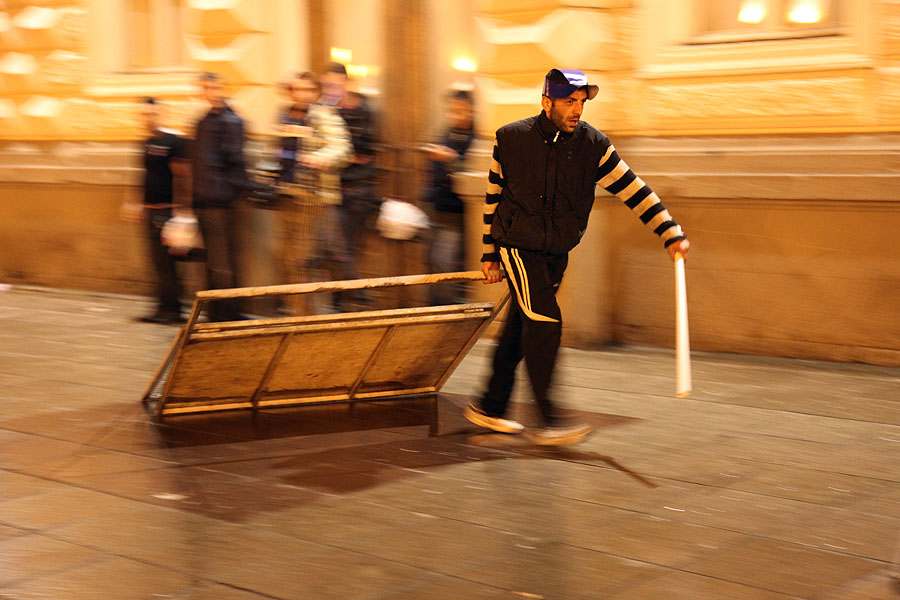
Violent Militants’ Camp Dispersed By Police in Tbilisi
Publication: Eurasia Daily Monitor Volume: 8 Issue: 102
By:

Some 500 demonstrators in a makeshift camp, many of them carrying long sticks and wearing masks, defied police calls to end an unlawful rally on the night of May 25 – 26 in downtown Tbilisi. The police preempted the militants’ declared intention to use violence on May 26, the twentieth anniversary of Georgia’s independence from the Soviet Union. Riot police dispersed the militants’ rally just after midnight using batons, water cannon and tear gas.
The intervention succeeded in a half-hour despite resistance from some of the militants. One policeman and one militant were accidentally run over and killed by the jeep motorcade of Nino Burjanadze and Badri Bitsadze, husband-and-wife leaders of the unlawful action, while fleeing from the scene. Thirty-seven persons, including nine policemen, are hospitalized with injuries. Some 90 persons were arrested during the clash and are being held on charges including disturbance of public order and resisting arrest.
Action leaders had announced their goal to block the official parade on the May 26 national day. To achieve that goal, the militants occupied a portion of the parade route on Rustaveli Avenue in front of the parliament building. There, they barricaded themselves behind movable steel fences, and stockpiled stones to be used on May 26 as projectiles. In the afternoon of May 25, a column of some 500 stick-carrying toughs staged an intimidating march through downtown Tbilisi. The militants have adopted a Communist partisan song, “Bella Ciao,” propagated in Soviet times, as the anthem for these protests. In the rioters’ camp, experienced militants instructed young ones how to make and throw Molotov cocktails at police cars. Georgian television broadcast this instruction scene on May 25, from footage recorded by a police camera hidden inside the rioters’ camp.
From a legal standpoint, the authorities acted scrupulously. They granted the permit for the rally, playing along with the militants’ fiction that this was a matter of freedom of assembly; although by the militants’ own statements—and their equipment—the rally was in fact a prelude to violent actions. The authorities, moreover, displayed undue—if perhaps inevitable—lenience by allowing the militants to block traffic on downtown Tbilisi streets for several consecutive days.
The permit for the Rustaveli Avenue rally expired at midnight, May 25 to 26. The authorities proposed several alternative locations for the rally to continue without blocking the national day parade. The militant organizers turned down all those proposals, determined as they were to challenge the government with the threat of violence on the appointed day and place. They had calculated on a win-win situation: either provoking the government into using disproportionate force and then posing as innocent victims, or alternately intimidating the government into acquiescence, thus setting a precedent with incalculable consequences to Georgia’s stability.
At the event, police intervened with judiciously calibrated force to disperse the militants after the expiry of the legal permit. The intervention demonstrated the modern training of Georgian police—one of the most successfully reformed institutions of the Georgian state. The state leadership was also aware that using disproportionate force would have exposed Georgia to criticism in the West, playing into the militants’ and Russia’s hands.
The U.S. Ambassador to Georgia, John Bass, issued on May 24 a statement of “concern that there are elements within these groups protesting who appear to be more interested in trying to force a violent confrontation than in peacefully protesting.” The “protesters’” right to hold a rally, Bass stated, must not interfere with the other citizens’ right to mark National Day. In a similar vein, French Ambassador Eric Fournier told Tbilisi media that “they have the right to rally, but not to hamper an official parade.” On May 26, after the clash, Bass told Georgian media that “there were clearly a number of people included in that protest who were not interested in peacefully protesting, but were looking to spark a violent confrontation.” He credited the authorities with offering alternative locations for the “protesters” to continue their rally on May 26 (Civil Georgia, May 24, 25, 26).
By contrast, a spokesperson for the European Commission in Brussels, identified as Natasha Butler, stated: “We understand a need to maintain law and order, but as we have already told the Georgian government, we consider that [it] needs to be done in a proportionate way. We reiterate that freedom of assembly is a democratic right and we consider that Georgia should uphold this democratic right” (AFP, May 26). In light of the actual events, this improvised statement displays a lack of familiarity with the forces at play and the situation on the ground in Tbilisi.




